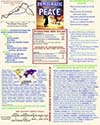[First published June 27, 2005] During the Cold War, I was intensely focused on the Soviet -American nuclear balance and our deterrence strategies versus a possible Soviet first strike capability. I’ve carried over to our time this focus on city attacks, almost completely forgetting about a fear that a Sovieet EMP nuclear attack was a major danger. I should not have, for now in this era of rogue nuclear states, an EMP attack is the most likely and dangerous, since it requires just one weapon and little accuracy.
On exploding, a nuclear weapon produces a blast of x-and gamma-rays that if triggered high above the United States would devastate the whole country’s infrastructure, disabling power grids, computers, microchips, electronic and electrical systems of information, including cell phones, and components of airplanes, and cars. For an important article on this, read Frank J. Gaffney’s “EMP: America’s Achilles’ Heel “. He is President of the Center for Security Policy and former assistant secretary of defense for international security policy. He says:
The emerging threat environment, characterized by a wide spectrum of actors that include near-peers, established nuclear powers, rogue nations, sub-national groups, and terrorist organizations that either now have access to nuclear weapons and ballistic missiles or may have such access over the next 15 years, have combined to raise the risk of EMP attack and adverse consequences on the U.S. to a level that is not acceptable.
Worse yet, the [EMP Threat] Commission observed that “some potential sources of EMP threats are difficult to deter.” This is particularly true of “terrorist groups that have no state identity, have only one or a few weapons, and are motivated to attack the U.S. without regard for their own safety.” The same might be said of rogue states, such as North Korea and Iran. They “may also be developing the capability to pose an EMP threat to the United States, and may also be unpredictable and difficult to deter.” Indeed, professionals associated with the former Soviet nuclear weapons complex are said to have told the Commission that some of their ex-colleagues who worked on advanced nuclear weaponry programs for the USSR are now working in North Korea.
Even more troubling, the Iranian military has reportedly tested its Shahab-3 medium-range ballistic missile in a manner consistent with an EMP attack scenario. The launches are said to have taken place from aboard a ship—an approach that would enable even short-range missiles to be employed in a strike against “the Great Satan.” Ship-launched ballistic missiles have another advantage: The “return address” of the attacker may not be confidently fixed, especially if the missile is a generic Scud-type weapon available in many arsenals around the world. As just one example, in December 2002, North Korea got away with delivering twelve such missiles to Osama bin Laden’s native Yemen. And Al Qaeda is estimated to have a score or more of sea-going vessels, any of which could readily be fitted with a Scud launcher and could try to steam undetected within range of our shores.
Given how one nuclear weapon exploded high above the United States would be a catastrophe as well as disable our ability to respond to the attack, this puts North Korean and Iranian nuclear developments in a new and more dangerous light.
Link of Note
“Will Bush’s Idealism Lead U.S. To Lose ‘War With Islam’?” (6/7/05) Book Review by Mort Kondracke
Kondracke says:
It certainly is no summer beach read, but you’ll be edified – and lots of people will be angered – by Robert Merry’s new book, “Sands of Empire,” a rich and deep critique of President Bush’s alleged “Crusader State” foreign policy.
I think that Merry, president and publisher of Congressional Quarterly, is far too pessimistic in saying that Bush is leading the country toward “calamity” by pursuing a policy of “humanitarian imperialism.” But Merry not only argues his case forcefully, he also bases it on intellectual history dating to the 17th century.
Colleague says: The book — Robert Merry — Sand of Empire — argues that Bush is going to undermine the US because he is in the tradition of utopian idealists who try to impose values, which as any good conservative can tell you, can’t be done…
Kondracke does the review, and notes the author has a core view centered on two schools of history: Progress vs. Cycles. Bush is a Progress guy, while “reality” is more Cycles (as with Huntington)….
The book seems most flawed in its apparent utter lack of understanding about democracy — that democracy is not an imposition of values, but the very antithesis. In fact, democracy is the only form of government that is explicitly anti-utopian: there is no state imposition of values; rather the state is a mechanism by which people can work out the inherent conflicts about values, peacefully.
Why can’t these otherwise bright people remember basic civics-govt 101 lessons? Maybe because they never really learned them. Maybe because the book is really a front for the more important agenda: hate – defeat Bush. Maybe because even though the author of the book is the publisher of Congressional Quarterly, he can’t see what is in front of him: peaceful resolution of an endless series of conflicts, without utopian value impositions by the state. Maybe because the guy is really not too bright after all….



 Posted by rudyrummel
Posted by rudyrummel 






